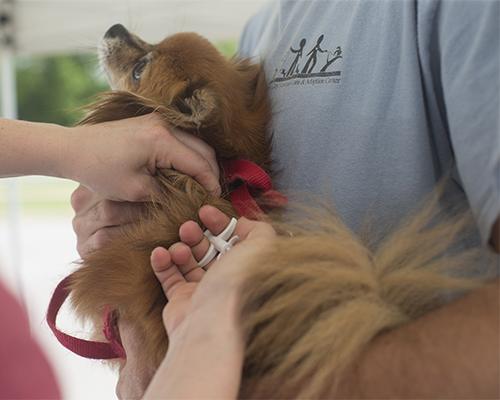Sarah Watson
Sarah-e-watson@uiowa.edu
Residence halls across campus have a common rule: no pets.
Federal law, however, allows students and tenants to keep animals in their living spaces for emotional support without specific training, and the University of Iowa is no exception.
Ten emotional-support animals are currently approved in UI campus housing despite the rule: three dogs, five cats, and two hamsters.
There are two categories of assistance animals covered under federal law: service animals and emotional-support animals. Neither require documentation of professional training. The UI considers both types as assistance animals.
Service animals are dogs or miniature horses trained to complete medically related tasks for their owners. An emotional-support animal, however, can be any animal.
“Naturally as humans, we could all use an emotional-support animal,” said Chelsey Montgomery, an Iowa City dog trainer. “Literally, you could go online and register an emotional-support animal and just do it, and that brings up some concerns because emotional-support animals are allowed now in housing units.”
The Emotional-Support Animal Registration of America can give a qualified patient a recommendation letter online for $130.
Two federal laws protect the rights of animals and their owners: the Americans with Disabilities Act and the Fair Housing Act.
ADA allows service animals in any public place but does not include emotional-support animals. Fair Housing, however, requires landlords to make accommodations for both emotional-support animals and service animals if needed.
Before the UI Housing & Dining allows students to bring animals to campus, Virginia Ibrahim-Olin, the department assistant director for contracts and assignments, said it wants students to understand what kind of commitment they are making.
“Just as students go through changes adjusting to living in a 600-person building, their animals do as well,” she said. “Sometimes, that can be a very easy transition, and sometimes, that can be quite challenging.”
For the UI to approve an assistance animal, students must provide documentation from physicians to show that they need the assistant animal, a veterinarian verification form to confirm the animal has proper vaccinations and social skills to live in a crowded living space, and a copy of the animals’ Johnson County licenses.
Students then a complete contracts and meet with UI Housing & Dining representative to go over expectations.
“We have some expectations around cleanliness, which is a major concern. We have expectations around handling of the animal,” Ibrahim-Olin said. “And we talk through what happens if those things don’t occur.”
Students and their animals would be asked to leave if violations continue, though Ibrahim-Olin said the department has not yet experienced this.
Service dogs and their owners retain certain rights under ADA while in public. Businesses can only ask two questions: Is the dog a service animal required because of a disability, and what work or task has the dog been trained to perform?
Members of the public cannot ask to see any documentation, ask the dog to perform the service, or ask about the person’s disability.
Bill Ender, whose service dog was trained by Montgomery, said sometimes there are people who take advantage of the laws because service dogs do not require professional training.
“There was one time we actually left because someone else’s service dog would not stay underneath the table and was barking,” Ender said, “My dog, Willow, stayed under the table; she did not react.”



